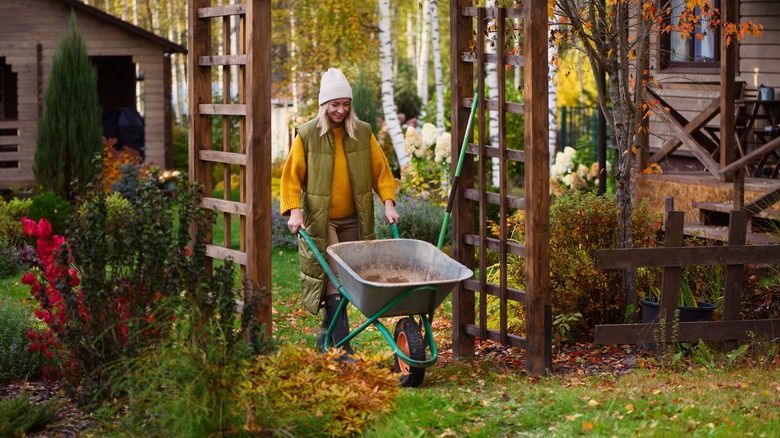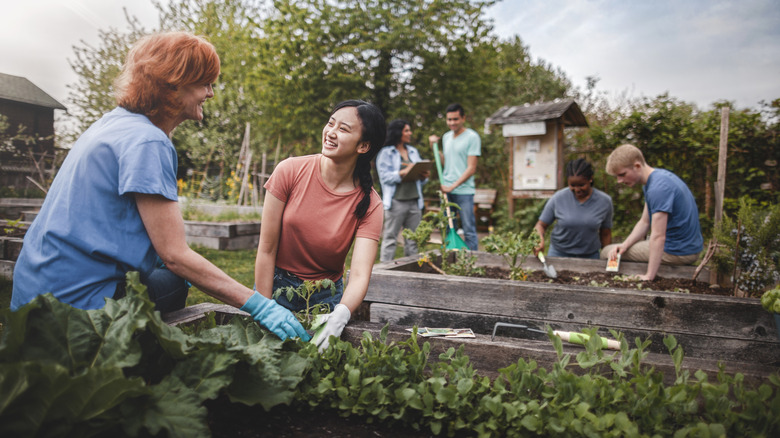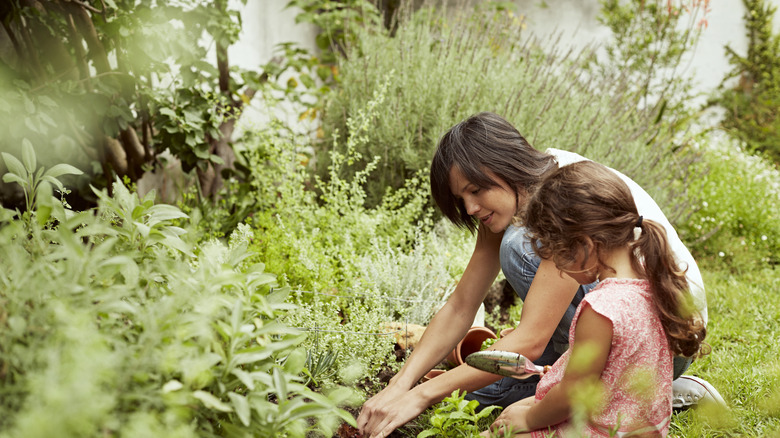14 Reasons Gardening Is Good For Your Health
In a fast-paced world where the incessant hum of technology and the concrete sprawl of urban landscapes have become the backdrop of our daily lives, the serene respite offered by the simple act of gardening has blossomed into a powerful antidote to the stresses of modern existence. Amid the ceaseless demands and digital distractions, the earthy connection forged through gardening stands as a testament to the enduring link between humans and the natural world.
As we navigate the complexities of contemporary living, it becomes increasingly evident that our well-being is intricately entwined with the environments we inhabit. Today, we're exploring the myriad ways in which gardening positively impacts individual and community well-being. From the therapeutic embrace of nature to communal bonds, gardening emerges as a transformative force, offering solace and rejuvenation in the face of life's relentless pace. Join us as we unearth the profound impact of gardening on our holistic well-being.
Gardening reduces stress
Scientific research has illuminated the profound impact of gardening on stress reduction. Numerous studies have explored the physiological and psychological benefits of engaging with nature, shedding light on the intricate mechanisms that make gardening a potent antidote to the stresses of contemporary living.
One of the key findings supporting the stress-reducing effects of gardening is the connection between exposure to green spaces and the regulation of the body's stress response. A 2013 Ecopsychology study underscored the positive correlation between time spent in natural environments — such as gardens — and a decrease in cortisol levels, the hormone associated with stress. Merely being at the garden site endowed these positive effects.
The rhythmic nature of gardening activities, from the delicate process of planting seeds to the mindful tasks of weeding and watering, has been specifically examined for its role in promoting relaxation. A 2020 study published in Scientific Reports found that engaging in repetitive, goal-directed tasks — commonplace in gardening — can induce a state of relaxed alertness, significantly reducing stress and anxiety levels. The tactile experience of working with soil, the scent of blooming flowers, and the gentle sounds of nature contribute to an immersive and calming sensory environment that builds resilience to stressors and enhances psychological well-being.
Gardening is a full body workout
The allure of gardening transcends into the domain of physical well-being. Rigorous scientific inquiry has affirmed what seasoned gardeners have known for generations — that the humble act of tending to a garden is, in fact, a holistic workout that engages the body in ways that promote cardiovascular health, flexibility, and muscular strength.
A meta-analysis in Preventive Medicine Reports has shed light on the physical benefits of gardening. One of the primary physical benefits of gardening lies in its contribution to cardiovascular health. Studies have shown that the aerobic components of gardening, such as digging and hoeing, elevate the heart rate and promote increased blood circulation. Gardening is also a catalyst for enhanced flexibility. Bending, reaching, and stretching while planting or weeding contribute to improved range of motion, reducing the risk of injuries and enhancing overall flexibility. Muscular strength, another pillar of physical fitness, is bolstered by the resistance encountered during common gardening tasks. The exertion required to dig into the soil, lift bags of compost, or prune branches stimulates the development of muscle strength, particularly in the arms, shoulders, back, and legs.
Crucially, gardening offers a refreshing departure from traditional exercise routines. It transforms physical activity from a structured, sometimes monotonous regimen into a purposeful, and thereby enjoyable, experience. This comprehensive involvement ensures that gardening serves as a full-body workout, rivaling more conventional forms of exercise, even in older adults.
Gardening improves mood
Beyond the apparent aesthetics of a well-tended garden lies a complex interplay of environmental factors and neurochemical responses that contribute to an enhanced emotional state.
Sunlight, a fundamental element of the gardening experience, plays a pivotal role in mood regulation. Exposure to natural light is intricately linked to the body's production of serotonin, a neurotransmitter known for its mood-stabilizing properties. The inhalation of fresh air during outdoor activities has been identified as another key factor in mood enhancement. Exposure to nature and the accompanying increase in oxygen intake can elevate mood and alleviate feelings of stress. The crisp, invigorating air in a garden setting serves as a natural tonic for the mind, fostering a sense of clarity and tranquility. The act of nurturing living plants adds another layer to the mood-boosting equation. Engaging in gardening activities triggers the release of endorphins, the body's natural mood enhancers.
Moreover, gardening offers a unique blend of sensory experiences that contribute to emotional well-being. The vibrant colors of blooming flowers, the earthy scent of soil, and the symphony of natural sounds create a sensory-rich environment that engages and uplifts the spirit. The immersive nature of gardening fosters a mindful connection with the present moment, promoting mental clarity and reducing the impact of stressors.
Eat a nutrient-rich diet courtesy of your garden
One of the distinctive advantages of home gardening lies in the assurance of a readily available supply of fresh, organic produce. The term "fresh from the garden" takes on a whole new significance when considering the nutritional value of homegrown produce. Time between harvest and consumption is minimized, reducing the degradation of vitamins, minerals, and antioxidants that are essential for the body's proper functioning. For instance, leafy greens like spinach and kale, when freshly picked, retain maximum levels of vitamins A and C, iron, and other vital nutrients.
The diverse array of fruits, vegetables, and herbs that can be cultivated in a home garden allows individuals to tailor their nutritional intake to their specific health needs. For example, growing nutrient-dense foods rich in vitamins, minerals, and antioxidants supports immune function, aids in digestion, and contributes to the prevention of chronic diseases.
Moreover, the absence of chemical pesticides and synthetic fertilizers in home gardens contributes to the organic integrity of the produce. Research from Germany's Institute of Organic Agriculture underscores that organic fruits and vegetables often contain higher concentrations of certain nutrients and antioxidants compared to conventionally grown counterparts. This organic bounty not only contributes to a healthier diet but also aligns with the growing preference for sustainable and environmentally conscious food choices.
Boost your immunity through your garden
The connection between gardening, soil, and immune health is rooted in the fascinating world of beneficial microbes that inhabit the very foundation of our gardens. At the heart of this intriguing connection is the microbial diversity present in healthy soils. Soil is a dynamic ecosystem teeming with bacteria, fungi, and other microorganisms, collectively known as the soil microbiome. These microbes play a pivotal role in shaping immune responses.
The Cold Spring Harbor Laboratory found that exposure to garden soil introduces the skin, often considered the body's first line of defense, to a wealth of beneficial microbes. As hands come into contact with the earth during planting, weeding, and other gardening activities, the skin absorbs these microbes, setting off a cascade of immune responses. This exposure, often referred to as "dirt therapy" or "soil-based immunization," has been associated with the activation of immune cells known as macrophages and neutrophils, enhancing their ability to combat pathogens and infections. Moreover, certain soil microbes have been shown to stimulate the production of cytokines, signaling proteins that regulate immune responses.
Gardening endows cognitive benefits
The act of nurturing plants is a natural elixir for brain health, enhancing memory, problem-solving skills, and overall cognitive well-being. At the forefront of these cognitive benefits lies the diverse range of tasks that gardening encompasses. From organizing the garden to the meticulous care of each plant — watering, pruning, and harvesting –the cognitive demands of gardening are both varied and stimulating. Engaging in these tasks fosters cognitive flexibility, the ability to adapt to new information, and changing circumstances.
Moreover, the sensory richness of the garden environment plays a crucial role in cognitive stimulation. The visual stimuli of vibrant blooms, the tactile experience of soil between fingers, and the olfactory delights of fragrant herbs collectively engage different regions of the brain. A research article published in the International Journal of Environmental Research and Public Health highlights the cognitive benefits of the mechanics of gardening as a tool to enhance overall cognitive performance in even populations living with dementia. The process of planning the garden layout, remembering specific plant care routines, and recognizing the unique characteristics of various plants all contribute to the enhancement of both short-term and long-term memory. Regular engagement in gardening activities correlates with improvements in memory recall and cognitive retention.
The act of problem-solving is inherent in gardening, as gardeners navigate challenges such as pest control, soil management, and plant diseases. Tackling these issues requires analytical thinking and creative problem-solving skills.
Gardening provides stimulations for seniors
For seniors, gardening stands as a gentle yet effective form of exercise, providing a low-impact alternative that nurtures mobility and flexibility.
Beyond the physical benefits, gardening bestows a meaningful responsibility, offering a reason to engage with the outdoors, tend to living organisms, and witness the tangible fruits of one's efforts. The sense of purpose derived from gardening can significantly contribute to mental well-being, combatting feelings of loneliness and providing a meaningful daily activity. Gardening also serves as a social outlet for seniors. Community gardens or gardening clubs specifically designed for older individuals provide opportunities for social interaction, fostering a sense of camaraderie and shared experiences.
Moreover, the outdoor environment inherent in gardening contributes to the overall stimulation of seniors. According to a study published in Sage Open Medicine, seniors who regularly garden reported an enhanced mood and overall better self-esteem. Exposure to natural light and fresh air has been linked to better sleep patterns and enhanced cognitive function.
Community gardens encourage social interaction
Community gardens, with their communal plots and shared spaces, emerge as veritable hubs of social interaction. Individuals from diverse backgrounds converge in these green oases, united by a common passion for cultivation. The act of gardening becomes a shared experience, fostering a sense of community and camaraderie that transcends societal boundaries. Gardening clubs, whether informal gatherings of neighbors or organized groups with a specific focus, provide structured platforms for like-minded individuals to come together. These clubs serve as forums for knowledge exchange, where seasoned gardeners share tips and novices seek guidance. The collaborative spirit inherent in gardening clubs has been shown to contribute to a sense of social support and collective learning.
Sharing gardening experiences with others is more than just a practical exchange of knowledge; it is the foundation for the cultivation of lasting connections. The bonds formed over discussions about the triumphs and challenges of cultivation go beyond the garden gate. Social interaction within the context of gardening provides a shared narrative that transcends the seasons, fostering a sense of continuity and community resilience. Engaging in collaborative gardening efforts has been linked to reduced feelings of isolation and increased levels of happiness.
Strengthen your family bonds by gardening together
When embraced as a family affair, gardening is not a mere horticultural pursuit but a shared journey of discovery, growth, and cherished moments spent outdoors. As family members unite amidst the soil and leaves, the garden becomes a canvas for shared activities and quality time outdoors, strengthening familial bonds. Whether it's preparing the soil, sowing seeds, or tending to the burgeoning plants, each task becomes a collaborative venture that nurtures the garden and the sense of togetherness within the family unit.
The inclusion of children in the gardening process adds a special dimension to this familial connection. Gardening becomes an interactive classroom where youngsters learn the practical skills of cultivation and develop a profound appreciation for the natural world. In this familial context, the garden becomes more than a plot of land—it is a living curriculum where generations share in the joys of discovery.
Beyond the tangible benefits, the act of gardening as a family offers intangible rewards. It serves as a natural catalyst for communication, as family members engage in conversations about the needs of the plants, the changing seasons, and the mysteries of the natural world. These shared moments of wonderment create lasting memories that bind family members together, forming a rich tapestry of shared experiences.
Gardening nurtures a mindful connection with the Earth
Gardening, with its demands for attention to detail and immersion in the sensory experience, becomes a practical and accessible path to cultivating mindfulness. The very act of observing plant growth becomes a meditative practice, a ritual that requires unwavering attention to the subtle changes occurring in the garden. Scientific investigations by the University of Edinburgh into the therapeutic benefits of nature affirm that focusing on the rhythmic cycles of plant life instills a sense of calm and connection to the natural world.
Smelling the fragrant bouquet of flowers or herbs and feeling the earth between one's fingers add sensory dimensions to the practice of mindful gardening. Sensory engagement with the environment fosters a heightened sense of presence and connection. The tactile experience of gardening becomes a grounding exercise, anchoring individuals in the richness of the immediate surroundings and creating a bridge between the human experience and the natural world.
Furthermore, the sense of connection fostered by gardening extends beyond the individual, encompassing a broader environmental awareness. Engaging with plants, soil, and the elements fosters a profound appreciation for the intricate web of life. As individuals witness the interdependence of flora and fauna in their garden ecosystems, a sense of responsibility and stewardship for the environment naturally unfolds.
Gardening sets the stage for quality sleep
As the day surrenders to the tranquility of the evening, the benefits reaped in the garden continue to unfold, casting a soothing influence on the realm of sleep. Gardening, with its inherent exposure to natural light, becomes a vital influencer of the body's circadian rhythms –the internal biological clock that regulates sleep-wake cycles. The fluctuations in light intensity and spectrum, experienced while working in the garden, signal the body to synchronize its internal clock with the natural day-night cycle, reinforcing a harmonious relationship with the sleep-wake pattern.
The physical activity embedded in gardening contributes further to the restorative embrace of quality sleep. Engaging in gardening tasks during the day, such as digging, planting, and weeding, not only provides a moderate form of exercise but also expends energy, creating a conducive environment for sleep.
Furthermore, the act of gardening promotes a sense of accomplishment and relaxation, which can be particularly beneficial for individuals grappling with stress or anxiety. As stress levels decrease through gardening activities, the body is more apt to transition into a state of calm conducive to a restful night's sleep.
Increase your vitamin D intake by gardening
The exposure to sunlight while gardening becomes a direct pathway to increased vitamin D production in the skin. Sunlight triggers the synthesis of vitamin D, specifically vitamin D3, in the body. Vitamin D is renowned for its vital role in bone health. It facilitates the absorption of calcium and phosphorus, essential minerals for bone strength. Adequate levels of vitamin D are associated with a reduced risk of bone-related conditions such as osteoporosis and fractures. Moreover, vitamin D has garnered attention for its potential role in reducing the risk of chronic diseases, including cardiovascular diseases, autoimmune disorders, and certain cancers.
However, the challenge arises for individuals living in colder climates where sunlight exposure is limited, especially during the winter months. In these regions, reduced sunlight can lead to insufficient vitamin D production in the skin. This deficiency can potentially impact bone health and may be associated with an increased risk of various health conditions. To address this, individuals in colder climates often need to explore alternative sources of vitamin D, including supplementation, when gardening under the sun isn't easily possible.
A green thumb can grow your savings
Access to a thriving garden serves as a strategic ally in managing household budgets. The perpetual availability of homegrown produce diminishes the reliance on store-bought alternatives, contributing to financial well-being by reducing the recurring costs associated with purchasing fresh fruits and vegetables. This aspect is particularly impactful in the context of rising food prices and fluctuating economic conditions. As individuals nurture their own fruits, vegetables, and herbs, the need to purchase these items diminishes.
Moreover, gardening is a dynamic and evolving investment. The initial investment in seeds, soil, and gardening tools is often outweighed by the bountiful harvest and the subsequent reduction in grocery expenses. The potential for long-term savings is accentuated by the fact that certain perennial plants, such as fruit-bearing trees and herbs, continue to yield harvests for years, further bolstering the economic benefits of gardening.
The financial wellness cultivated through gardening extends beyond the immediate impact on grocery bills. The sense of self-sufficiency and empowerment derived from growing one's food instills a frugal mindset that can permeate other aspects of financial decision-making. Individuals who engage in gardening often exhibit heightened financial awareness and more prudent spending habits.
Gardening is natural aromatherapy
It is through the use of aromatic compounds in the garden that we are able to cultivate a spectrum of positive emotional states. It is known that certain plants, including lavender and chamomile, have calming properties that have the ability to alleviate stress and promote relaxation. A plant like rosemary or peppermint, on the other hand, produces invigorating scents that stimulate the senses and enhance alertness when inhaled. In the garden, these fragrant companions become allies in the rejuvenation of your mind and body.
Getting into contact with fragrant plants is a great way to maximize the benefits of aromatherapy in the garden. As a result of the combination of sensory stimuli, including visual beauty and tactile interaction, the overall experience is enhanced. The rhythmic motion of gardening tasks, coupled with the inhalation of natural scents become a reservoir of tranquility or invigoration that individuals can draw upon in everyday life.














